Maine gubernatorial election, 1848
|
|
|
|
The Maine gubernatorial election, 1848, was an election held in 1848 in the state of Maine to decide Maine's next governor.
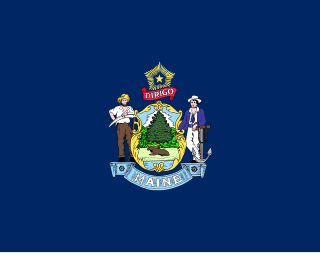
Maine is a state in the New England region of the northeastern United States. Maine is the 12th smallest by area, the 9th least populous, and the 38th most densely populated of the 50 U.S. states. It is bordered by New Hampshire to the west, the Atlantic Ocean to the southeast, and the Canadian provinces of New Brunswick and Quebec to the northeast and northwest respectively. Maine is the easternmost state in the contiguous United States, and the northernmost state east of the Great Lakes. It is known for its jagged, rocky coastline; low, rolling mountains; heavily forested interior; and picturesque waterways, as well as its seafood cuisine, especially lobster and clams. There is a humid continental climate throughout most of the state, including in coastal areas such as its most populous city of Portland. The capital is Augusta.

The Governor of Maine is the chief executive of the State of Maine. Before Maine was admitted to the Union in 1820, Maine was part of Massachusetts and the Governor of Massachusetts was chief executive.
John W. Dana was the incumbent Democrat, and won the election. The challenger was Elijah Hamlin, of the Whig party who was the brother of future Vice President of the United States under Abraham Lincoln, Hannibal Hamlin.

John Winchester Dana was an American businessman and Democratic politician in the U.S. state of Maine. He served as the 19th and 21st Governor of Maine and as Chargé d'affaires to Bolivia during the 19th century.

The Democratic Party is one of the two major contemporary political parties in the United States, along with the Republican Party. Tracing its heritage back to Thomas Jefferson and James Madison's Democratic-Republican Party, the modern-day Democratic Party was founded around 1828 by supporters of Andrew Jackson, making it the world's oldest active political party.
Elijah Hamlin was an American lawyer, businessman and historian. He was the older brother of future Vice President of the United States Hannibal Hamlin and graduated from Brown University. He set up a law practice in Waterford, Maine and eventually settled in Bangor, Maine. He ran for Governor of Maine in 1848 and 1849 as a Whig. He also served in the Maine State Senate, in 1837 and 1858-1859 and in the Maine House of Representatives in 1830-1832 and 1847-1848, and was the Mayor of Bangor from 1851-1852.
This page is based on this
Wikipedia article Text is available under the
CC BY-SA 4.0 license; additional terms may apply.
Images, videos and audio are available under their respective licenses.

The United States presidential election of 1848 was the 16th quadrennial presidential election, held on Tuesday, November 7, 1848. In the aftermath of the Mexican–American War, General Zachary Taylor of the Whig Party defeated Senator Lewis Cass of the Democratic Party. The contest was the first presidential election that took place on the same day in every state, and it was the first time that Election Day was statutorily a Tuesday.
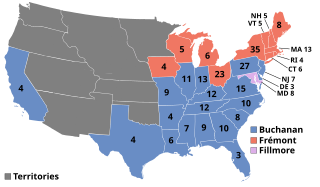
The United States presidential election of 1856 was the 18th quadrennial presidential election, held on Tuesday, November 4, 1856. In a three-way election, Democrat James Buchanan defeated Republican nominee John C. Frémont and American Party nominee Millard Fillmore.
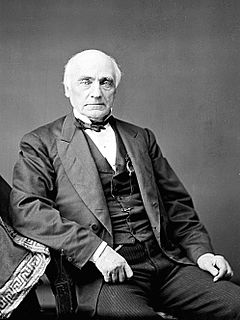
Lot Myrick Morrill was an American statesman who served as the 28th Governor of Maine, in the United States Senate and as Secretary of the Treasury appointed by President Ulysses S. Grant. Morrill was an accomplished politician serving several elected and appointed offices throughout his lifetime. Morrill, as Secretary of Treasury, was devoted to hard currency rather than paper money and dedicated himself to serve the public good rather than party interests. Morrill was popularly received as Treasury Secretary in the American press and Wall Street, known for his financial and political integrity. Morrill was President Grant's fourth and last U.S. Secretary of the Treasury.

John Young was an American politician. He served in the United States House of Representatives and as Governor of New York.
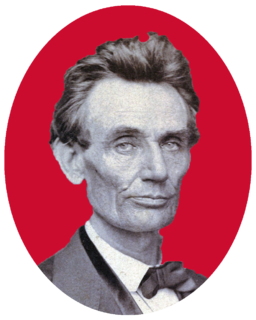
The 1860 Republican National Convention, also known as the 2nd Republican National Convention, was a nominating convention of the Republican Party of the United States, held in Chicago, Illinois, from May 16 to 18, 1860. The gathering nominated former U.S. Representative Abraham Lincoln of Illinois for President of the United States and Senator Hannibal Hamlin of Maine for Vice President.
In the United States politics, party switching is any change in party affiliation of a partisan public figure, usually one who is currently holding elected office. Use of the term "party switch" can also connote a transfer of held power in an elected governmental body from one party to another.

John Hubbard was the 22nd Governor of Maine in the United States.

The Maine gubernatorial election of 2006 took place on November 7, 2006. Incumbent Democrat John Baldacci was re-elected to his second term. This was the last time a Democrat won statewide office in Maine until 2018, when Janet Mills won the gubernatorial election over Republican Shawn Moody.
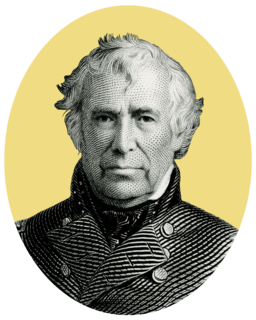
The 1848 Whig National Convention was a quadrennial presidential nominating convention of the Whig Party. The convention was held in Philadelphia. War hero Zachary Taylor, a major general from Louisiana with no political background, was nominated as the party's candidate for president. Former New York Representative Millard Fillmore was nominated for vice president. They won the 1848 presidential election, defeating the Democratic candidates Lewis Cass and William O. Butler.

Seldon Connor was an American soldier, banker, and politician who was the 35th Governor of the U.S. state of Maine.

Joseph Hartwell Williams was an American politician who served as the 27th Governor of Maine from 1857 to 1858.
The following table indicates the party of elected officials in the U.S. state of Maine:
The 1849 United States Senate election in New York was held on February 6, 1849, by the New York State Legislature to elect a U.S. Senator to represent the State of New York in the United States Senate.

The 1852 United States elections elected the members of the 33rd United States Congress. The election marked the end of the Second Party System, as the Whig Party ceased to function as a national party following this election. Democrats won the presidency and retained control of both houses of Congress.

The Hannibal Hamlin House is a historic house at 15 5th Street in Bangor, Maine. Built c. 1848-51, this well-preserved Italianate house was the home of United States Vice President Hannibal Hamlin from 1862 until his death in 1891. From 1933 until 2007 it served as the official residence of the president of Bangor Theological Seminary. It was listed on the National Register of Historic Places in 1979.

















